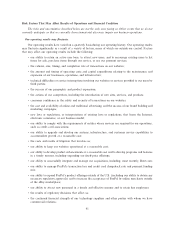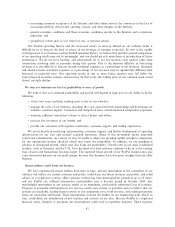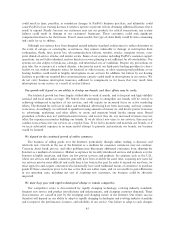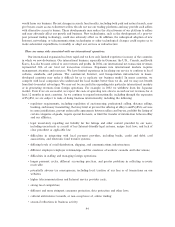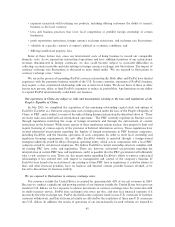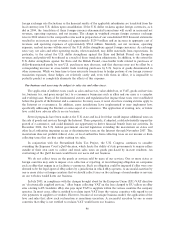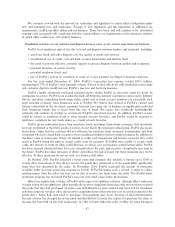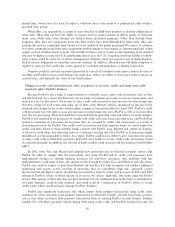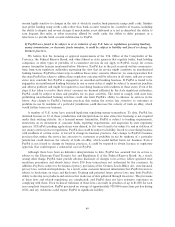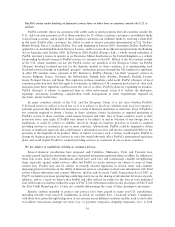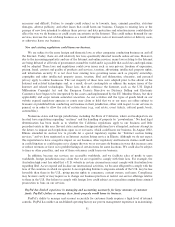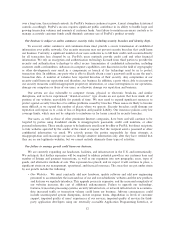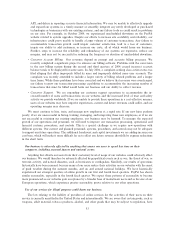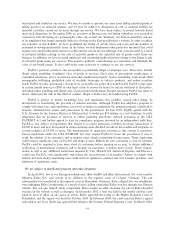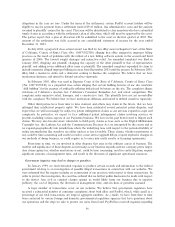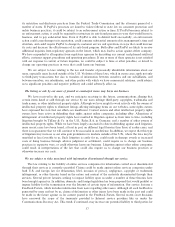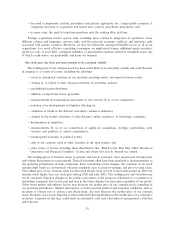eBay 2004 Annual Report Download - page 53
Download and view the complete annual report
Please find page 53 of the 2004 eBay annual report below. You can navigate through the pages in the report by either clicking on the pages listed below, or by using the keyword search tool below to find specific information within the annual report.necessary and diÇcult. Failure to comply could subject us to lawsuits, Ñnes, criminal penalties, statutory
damages, adverse publicity, and other losses that could harm our business. Changes to existing laws or the
passage of new laws intended to address these privacy and data protection and retention issues could directly
aÅect the way we do business or could create uncertainty on the Internet. This could reduce demand for our
services, increase the cost of doing business as a result of litigation costs or increased service or delivery costs,
or otherwise harm our business.
New and existing regulations could harm our business.
We are subject to the same foreign and domestic laws as other companies conducting business on and oÅ
the Internet. Today, there are still relatively few laws speciÑcally directed towards online services. However,
due to the increasing popularity and use of the Internet and online services, many laws relating to the Internet
are being debated at all levels of government around the world and it is possible that such laws and regulations
will be adopted. These laws and regulations could cover issues such as user privacy, freedom of expression,
pricing, fraud, content and quality of products and services, taxation, advertising, intellectual property rights,
and information security. It is not clear how existing laws governing issues such as property ownership,
copyrights and other intellectual property issues, taxation, libel and defamation, obscenity, and personal
privacy apply to online businesses. The vast majority of these laws were adopted prior to the advent of the
Internet and related technologies and, as a result, do not contemplate or address the unique issues of the
Internet and related technologies. Those laws that do reference the Internet, such as the U.S. Digital
Millennium Copyright Act and the European Union's Directive on Distance Selling and Electronic
Commerce have begun to be interpreted by the courts and implemented by the EU Member States, but their
applicability and scope remain somewhat uncertain. As our activities and the types of goods listed on our
website expand, regulatory agencies or courts may claim or hold that we or our users are either subject to
licensure or prohibited from conducting our business in their jurisdiction, either with respect to our services in
general, or in order to allow the sale of certain items (e.g., real estate, event tickets, cultural goods, boats,
automobiles).
Numerous states and foreign jurisdictions, including the State of California, where our headquarters are
located, have regulations regarding ""auctions'' and the handling of property by ""pawnbrokers.'' No Ñnal legal
determination has been made as to whether the California regulations apply to our business and little
precedent exists in this area. Several states and some foreign jurisdictions have attempted, and may attempt in
the future, to impose such regulations upon us or our users, which could harm our business. In August 2002,
Illinois amended its auction law to provide for a special regulatory regime for ""Internet auction listing
services,'' and we have registered as an Internet auction listing service in Illinois. Although we do not expect
this registration to have a negative impact on our business, other regulatory and licensure claims could result
in costly litigation or could require us to change the way we or our users do business in ways that increase costs
or reduce revenues or force us to prohibit listings of certain items for some locations. We could also be subject
to Ñnes or other penalties, and any of these outcomes could harm our business.
In addition, because our services are accessible worldwide, and we facilitate sales of goods to users
worldwide, foreign jurisdictions may claim that we are required to comply with their laws. For example, the
Australian high court has ruled that a U.S. website in certain circumstances must comply with Australian laws
regarding libel. As we expand and localize our international activities, we become obligated to comply with the
laws of the countries in which we operate. Laws regulating Internet companies outside of the U.S. may be less
favorable than those in the U.S., giving greater rights to consumers, content owners, and users. Compliance
may be more costly or may require us to change our business practices or restrict our service oÅerings relative
to those in the U.S. Our failure to comply with foreign laws could subject us to penalties ranging from criminal
prosecution to bans on our services.
PayPal has limited experience in managing and accounting accurately for large amounts of customer
funds. PayPal's failure to manage these funds properly would harm its business.
PayPal's ability to manage and account accurately for customer funds requires a high level of internal
controls. PayPal has neither an established operating history nor proven management experience in maintaining,
51


